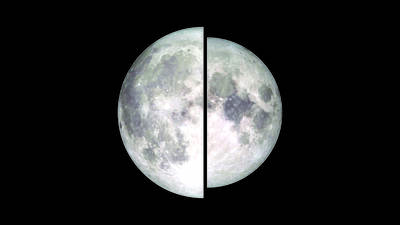Renowned British physicist Stephen Hawking, who sought to explain some of the most complicated questions of life while himself working diligently under the shadow of a likely premature death throughout his life, died at 76 at his home in Cambridge, the UK, on Wednesday morning.
Hawking’s formidable mind ceaselessly probed the very limits of human understanding both in the vastness of space and in the bizarre sub-molecular world of quantum mechanics, which explains how the smallest particles in the universe function and through its theoretical elaboration, according to Hawking, could predict what happens at the beginning and end of time.
By bringing together the theory of relativity, which explores the nature of space and time, and quantum theory, Hawking focused in his academic works on explaining the creation of the universe and how it is governed.

Photo: AFP
照片:法新社
In 1974, Hawking was admitted to Britain’s most prestigious scientific body, the Royal Society, and became one of its youngest fellows at the age of 32. Five years later, Hawking moved from Oxford University to Cambridge University to study further theoretical astronomy and cosmology. Cambridge University appointed him as Lucasian Professor of Mathematics, a prestigious post of which the previous holders include Newton.
Throughout his life, Hawking worked on studies ranging from the origins of the universe to the tantalizing prospect of time travel to the mysteries of space’s all-consuming black holes.
But the power of his intellect contrasted cruelly with the weakness of his body, ravaged by the wasting motor neurone disease he contracted at the age of 21.
Hawking was confined for most of his life to a wheelchair. As his condition worsened, he had to resort to speaking through a voice synthesizer and communicating by moving his eyebrows. The disease spurred him to work harder but also contributed to the collapse of his two marriages, he wrote in a 2013 memoir My Brief History.
In the book he related how he was first diagnosed: “I felt it was very unfair — why should this happen to me,” he wrote. “At the time, I thought my life was over and that I would never realize the potential I felt I had. But now, 50 years later, I can be quietly satisfied with my life.”
Hawking shot to international fame after the 1988 publication of A Brief History of Time, one of the most complex books ever to achieve mass appeal, which stayed on the Sunday Times bestseller list for no fewer than 237 weeks. He said he wrote the book to convey his own excitement over recent discoveries about the universe.
“My original aim was to write a book that would sell on airport bookstalls,” he told reporters at the time. “In order to make sure it was understandable I tried the book out on my nurses. I think they understood most of it.”
(Reuters, with additional reporting by staff writer)
知名的英國物理學家史蒂芬·霍金,週三早上在英國劍橋的家中過世,享壽七十六歲。終其一生,霍金試圖解開最為複雜艱深的生命之謎,自己卻同時面臨著英年早逝的可能,一輩子在死亡的陰影下孜孜矻矻地從事研究。
霍金以令人敬畏的卓越才智,不斷探索著人類理解程度的最極限,範圍大至廣闊無垠的宇宙,小至量子力學中奇異的次分子世界。量子力學理論解釋了宇宙中最小粒子的運作模式,因此他認為,推演這個理論,將能預測時間在最初的起始點與終點各會發生什麼現象。
藉著結合量子力學以及探討空間與時間關係的廣義相對論,霍金在學術著述中聚焦於對宇宙起源以及運行規則提出解釋。
一九七四年,霍金以三十二歲之齡當選英國皇家學會院士,成為英國聲譽最為崇高的科學研究機構中最年輕的研究者之一。五年之後,他從牛津大學遷往劍橋大學,以進一步深入研究理論天文學以及宇宙科學。翌年,霍金獲劍橋大學授予盧卡斯數學教授的頭銜,該席位是物理學者的最高榮譽,獲頒此頭銜的歷任教授還包括牛頓。
霍金畢生的研究領域包含探討宇宙的起源,廣而擴及到誘人的時間旅行可能性,乃至於在太空中吞噬一切的黑洞之謎。
只是,霍金的非凡才智卻和身體上的衰弱形成殘酷的對比。二十一歲時,他被診斷出罹患運動神經元疾病,從此飽受病痛折磨,身體逐漸衰弱。
霍金大半輩子的行動都受輪椅所限制。隨著病情惡化,他被迫仰賴語音合成器來說話,並且藉由眉毛動作來進行溝通。他在二○一三年出版的回憶錄《我的簡史》中表示,這個惡疾驅使他更戮力從事學術研究,卻也造成兩次婚姻的失敗。
在回憶錄中,霍金提及當年第一次被診斷出罹病的感受:「我感覺這非常不公平──為什麼這疾病要發生在我的身上」。他寫道:「那時,我以為我的生命就此結束,不會再有機會實現我自認擁有的潛能。不過,從五十年後的今天看來,可以說我已經對生命感到相當滿足。」
一九八八年出版的《時間簡史》,讓霍金瞬間獲得國際間的崇高聲望。《時間簡史》可說是廣獲大眾青睞的書中最為艱澀難懂的一本,卻在《星期日泰晤士報》的暢銷書排行榜上一待就是兩百三十七週。霍金說,他寫這本書的目的其實是想傳達近年來關於宇宙的新發現對自己帶來的興奮感。
「我原本的目標是想寫一本會被放在機場書架上賣的那種暢銷書。」霍金那時這麼跟記者解釋。「為了確定這本書可以讓人看得懂,我讓照顧我的護理師們都試讀過,我想他們能夠了解書中絕大部分的內容。」
(台北時報章厚明編譯)

Have you ever gazed at the night sky and felt as though the Moon loomed larger than usual? Your eyes were not deceiving you. The Moon’s apparent size can __1__ subtly depending on where it is in its orbit. On certain occasions, it reaches its fullest phase while at its closest point to Earth. When these two events __2__, scientists and the public refer to the spectacle as a “supermoon.” The Moon does not orbit our planet in a perfect circle. Instead, it travels along a more oval-shaped __3__, completing one full orbit every 27 days. Consequently, there are times when

A: South Korea’s Golden Disc Awards ceremony is taking place at the Taipei Dome on Saturday. Eighteen acts are taking to the stage, including Blackpink’s Jennie. B: The hottest boy group CORTIS is also performing. I can’t wait to see James, the Taiwanese member of the band, perform. A: Who else are playing at the K-pop show? B: This year’s lineup is stacked, including: Allday Project, ARrC, Ateez, Boynextdoor, Close Your Eyes, Enhypen, IVE, Izna, KiiiKiii, Le Sserafim, Monsta X, NCT Wish, Stray Kids, TWS, Zerobaseone and Zozazz. A: SKZ, Enhypen and Ateez dominated Billboard’s 2025 Year-End World

A: Aside from K-pop, what were the English chart-toppers? B: Billboard’s top three singles for 2025 were “Die with a Smile” by Lady Gaga/Bruno Mars, “Luther” by Kendrick Lamar/SZA and “A Bar Song (Tipsy)” by Shaboozey. Plus, pop diva Mariah Carey’s 1994 megahit “All I Want for Christmas Is You” won its 20th and 21st weeks at No. 1, becoming the longest-running No. 1 song in history. A: How about in Taiwan? The news says nine of the 10 most-streamed songs on Spotify Taiwan were Korean. B: Yup, and the top three were: “Winter Ahead” by BTS’ V and Park

AI-generated summaries are shaking up the media world. Tools like Google’s AI Overviews now provide users with direct answers above the search results, resulting in fewer people clicking on news links. For publishers who rely on that traffic to generate advertising revenue, this shift is hitting hard. The fallout is measurable. Many sites have seen a sharp drop in traffic since AI summary features rolled out. An analysis revealed that a news outlet that had once ranked first on Google lost up to 79% of its traffic when its link appeared beneath an AI-generated summary. Statistics also show that